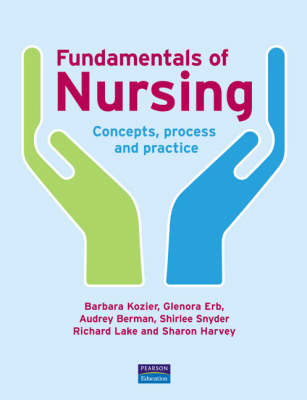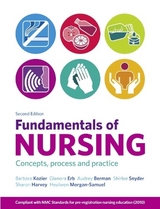
Fundamentals of Nursing
Pearson Education (Verlag)
978-0-13-197653-5 (ISBN)
- Titel erscheint in neuer Auflage
- Artikel merken
Nurses today must be able to grow and evolve in order to meet the demands of a changing health care system. Fundamentals of Nursing helps them on this journey with comprehensive coverage of contemporary professional nursing.
This book has been designed to support student nurses at undergraduate level, particularly those on the Common Foundation Programme and is the only text in the market that equally addresses nursing theory and practice.
"Kozier is an excellent resource for students throughout their training, and could be used as the starting point for most of their assessments. Overall, it is an excellent text that I will have no hesitation in recommending to my students." - Dorothy Adam, Lecturer, Nursing & Midwifery, The Robert Gordon University "The text is an exciting, clear and essential textbook for pre-registration nursing students. It sets the scene, shows application to practice, helps to make nursing practice more understandable and so enhances the student's learning experience." - Martin Bailey, Senior Lecturer, Nursing and Applied Clinical Studies, Christ Church University Canterbury
Contents
1 Historical and current nursing practice
Learning outcomes
Stereotypes of nurses
The history of nursing
Current nursing practice
Roles and functions of the nurse
Criteria of a profession
Factors influencing current nursing practice
Nurse education
Nursing research
Chapter highlights
References
2 Nursing models, theories and care pathways
Learning outcomes
Introduction
Introduction to theories in other disciplines
The metaparadigm for nursing
Purposes of nursing theory
Overview of selected nursing theories/models
Critique of nursing theory
Nursing process, care and frameworks
Chapter highlights
References
3 Legal aspects of nursing
Learning outcomes
Overview of the British legal system and common legal terms
Nursing as a profession
The Nursing Midwifery Council
The role of the Nursing Midwifery Council
Accountability
Human Rights Act 1998
Duty of care
Liability for acts or omissions
Consent
Mental Health Act 1983
Advanced directives
Access to health records and the Data Protection Act
Chapter highlights
Guidance
4 Professional and ethical aspects of nursing
Learning outcomes
Introduction
Values
Morality and ethics
Nursing ethics
Specific ethical issues
Advocacy
Chapter highlights
References
5 Health, wellness and illness
Learning outcomes
Introduction
Concepts of health, wellness and well-being
Models of health and wellness
Variables influencing health status, beliefs and practices
Health belief models
Health care compliance
Illness and disease
Individual health
Family health
Applying theoretical frameworks to individuals and families
Community health
Culture and cultural care nursing
Concepts related to cultural care nursing
Health traditions and health benefits
Chapter highlights
References
6 Aspects of psychosocial health
Learning outcomes
Introduction
Components of self-concept
Factors that affect self-concept
Sexuality
Spirituality
Spiritual practices affecting nursing care
Spiritual health and the nursing process
Stress
Chapter highlights
References
7 Health promotion
Learning outcomes
Introduction
Defining health promotion
Sites for health-promotion activities
Approaches to health promotion
Health promotion models
Stages of health behaviour changes
The nursing process and health promotion
Chapter highlights
References
8 Healthcare delivery: settings and process
Learning outcomes
Introduction
The National Health Service
Types of health care agencies and services
Types of health care services
Providers of healthcare
Factors affecting healthcare delivery
Frameworks for care
Chapter highlights
References
9 The nursing process
Learning outcomes
Critical thinking
Skills in critical thinking
Applying critical thinking to nursing practice
Developing critical thinking attitudes and skills
Assessment as part of the nursing process
Data
Planning the interview and setting
Data Management
Diagnosing
The diagnostic process
Ongoing development of nursing diagnoses
Planning
Developing nursing care plans
The planning process
Implementing
Evaluating
Chapter highlights
References
10 Mental health
Learning outcomes
Mental health defined
Substance abuse/misuse
Mental health disorders
Psychological treatments
Depression and its effects
Medication - mood stabilisers
Memory problems
Post-traumatic stress disorder
Chapter highlights
Guidance and further information
11 Infection control
Learning outcomes
Micro-organisms and infection
Types of infections
Chain of infection
Body defences against infection
Factors increasing susceptibility to infection
Isolation precautions
Isolation practices
Infection control for healthcare workers
Role of the infection control nurse
Chapter highlights
References
12 Moving and handling: promoting the safety of the patient and the nurse
Learning outcomes
Introduction
Legal and professional responsibilities
Human Rights
The spine
Principles of biomechanics
Risk assessment
Handling an inanimate load
Patient handling
Chapter highlights
Guidance
13 Hygiene
Learning outcomes
Introduction
Hygienic care
Skin
Feet
Nails
Mouth
Hair
Eyes
Ears
Nose
Supporting a hygienic environment
Making beds
Chapter highlights
References
14 Skin integrity and wound care
Learning outcomes
Introduction
Skin integrity
Types of wounds
Pressure ulcers
Wound healing
Chapter highlights
References
15 Vital signs
Learning outcomes
Introduction
Body temperature
Pulse
Respirations
Blood pressure
Oxygen saturation
Chapter highlights
References
16 Oxygenation
Learning outcomes
Physiology of the respiratory system
Respiratory regulation
Factors affecting respiratory function
Alterations in respiratory function
Chapter highlights
References
17 Nutrition
Learning outcomes
Introduction
Macronutrients
Energy balance
Healthy diet
Body weight
Factors affecting nutrition
Altered nutrition
Chapter highlights
References
18 Hydration
Learning outcomes
Body fluids and electrolytes
Acid base balance
Factors affecting body fluid, electrolytes and acid base balance
Disturbances in fluid volume, electrolyte and acid base balances
Chapter highlights
References
19 Bowel elimination
Learning outcomes
Physiology of defecation
Factors that affect defecation
Bowel elimination problems
Bowel diversion ostomies
Chapter highlights
References
20 Urinary elimination
Learning outcomes
Physiology of urinary elimination
Urination
Factors affecting voiding
Urinary elimination problems
Chapter highlights
References
21 Administration of medication
Learning outcomes
Introduction
Drug standards
Legal aspects of drug administration
Effects of drugs
Drug misuse
Actions of drugs on the body
Factors affecting medication action
Routes of administration
Medication prescriptions and charts
Systems of measurement: metric system
Administering medications safely
Oral medications
Nasogastric and gastrostomy medications
Parenteral medications
Respiratory inhalation
Summary
Chapter highlights
References
22 Pain management
&nbsnb outcomes
Introduction
Types of pain
Concepts associated with pain
Physiology of pain
Chapter highlights
References
23 Activity and exercise
Learning outcomes
Introduction
Normal movement
Exercise
Factors affecting body alignment and activity
Effects of immobility
Rest and sleep
Physiology of sleep
Functions of sleep
Normal sleep patterns and requirements
Factors affecting sleep
Common sleep disorders
Chapter highlights
References
24 Pre- and post-operative care
Learning outcomes
Introduction
Classification of surgery
Pre-operative phase
Intra-operative phase
Post-operative phase
Chapter highlights
References
25 Emergency management of the patient and resuscitation
Learning outcomes
Introduction
Early recognition of the sick patient to prevent cardiac arrest
Early cardiopulmonary resusitation (CPR)
Early defibrillation: to restart the heart
Post-resuscitation care
Chapter highlights
References
26 Physical assessment and diagnostic testing
Learning outcomes
Intoduction
Complete physical assessment
General assessment
The skin, hair and nails
The head
Neurological system
Neck
Thorax and lungs
Cardiovascular and peripheral vascular systems
Breasts and axillae
Abdomen
Musculoskeletal system
Female genitals and inguinal area
Male genitals and inguinal area
Rectum and anus
Chapter highlights
Reference
Index
| Erscheint lt. Verlag | 17.12.2007 |
|---|---|
| Sprache | englisch |
| Maße | 274 x 211 mm |
| Gewicht | 2096 g |
| Themenwelt | Medizin / Pharmazie ► Pflege |
| ISBN-10 | 0-13-197653-2 / 0131976532 |
| ISBN-13 | 978-0-13-197653-5 / 9780131976535 |
| Zustand | Neuware |
| Haben Sie eine Frage zum Produkt? |
aus dem Bereich



